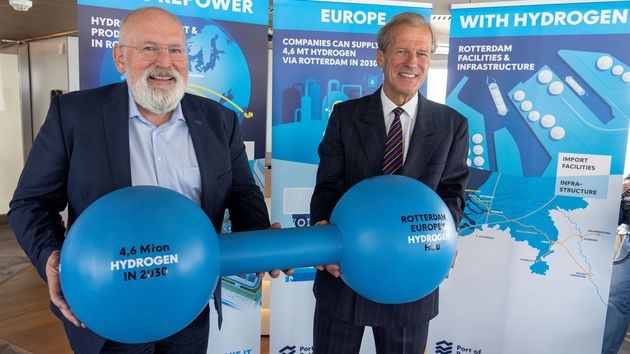The Port of Rotterdam has unveiled an ambitious plan to supply regional transport and industrial end-users in Europe with 4.6 million tonnes of sustainable hydrogen annually by 2030. Europe’s largest port indicated that the deal would involve arrangements with about 70 companies and hydrogen-exporting countries.
The project was outlined Tuesday by Allard Castelein, CEO of the Port of Rotterdam Authority, to European Climate Change Commissioner Frans Timmermans (per photo).
The initiative advances the development of a “hydrogen economy” for the region, with the focus on fueling European industry and inland road and barge transport rather than producing an alternative power for container shipping.
Rotterdam’s import and distribution of hydrogen on such a scale will enable the port and its connected companies to supply end-users with large volumes of hydrogen “affordably, safely, and reliably,” the port said..
“Using sustainable hydrogen substantially contributes to the European objectives of reducing climate change and increasing Europe’s energy independence,” declared Allard Castelein, CEO of the Port of Rotterdam Authority.
The volume of hydrogen generated by the initiative will represent a fourfold increase in the supply envisioned in the European Union’s “Fit for 55” package that was added to Europe’s Green Deal climate law last July.
Rotterdam did not put a price tag on its plan, but it will require a substantial pipeline infrastructure within North Europe’s coastal industrial clusters and between the port and inland industrial clusters, allowing Rotterdam to transport hydrogen to steel, chemical, and cement industries, as well as to filling stations to fuel trucks and barges, the port statement noted.
Hydrogen is an alternative to oil and natural gas as energy and as a raw material, according to the Port of Rotterdam. Many companies are working on projects to produce hydrogen in Northwestern Europe with green power or to produce it at locations with more sunshine, wind, and open space.
“Hydrogen made in Latin America or Australia for instance, can be shipped to Rotterdam efficiently and on a large scale, processed here, and then be transported to the hinterland,” the Rotterdam statement said.
But the port noted there are two crucial preconditions that need to be met before large-scale importing of hydrogen could begin – certification of green hydrogen and bridging the substantial cost gap between renewable and low-carbon hydrogen and their carbon dioxide-emitting alternatives. (Photo from Port of Rotterdam)





